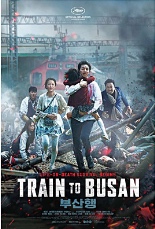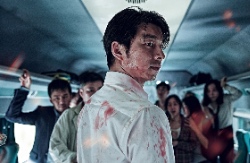
 Hop aboard the Train to Busan, although I certainly can understand any hesitation on your part. After suffering through so many awful films of the undead, I had no desire to see yet another zombie movie. Especially a Korean one that is two hours long. Nothing against the Koreans — or any Asian people — but they are known for letting running times overstay their welcome, so when a film hurts, the pain is extended.
Hop aboard the Train to Busan, although I certainly can understand any hesitation on your part. After suffering through so many awful films of the undead, I had no desire to see yet another zombie movie. Especially a Korean one that is two hours long. Nothing against the Koreans — or any Asian people — but they are known for letting running times overstay their welcome, so when a film hurts, the pain is extended.
But seriously, all aboard! Because Train to Busan not only subverted my expectations, but exceeded them. It is an instant classic of zombie cinema, as well as Eastern Hemisphere horror.
Leaving the station in Seoul, the KTX 101 bullet train is bound for the port city of Busan, some 200 miles away. Fund manager Seok Woo (Gong Yoo, The Suspect) is on it, to deliver his adorable moppet daughter (Kim Soo-ahn, the 2014 omnibus Mad Sad Bad) to her mother, from whom he is divorced — and bitterly so. Just before the doors close, a very special passenger stumbles on undetected: one infected with a killer virus that … hell, you already know the symptoms and the side effects.
 The resulting outbreak threatens to decimate the entire passenger list, which includes a baseball team, a lone cheerleader, an expectant couple, a selfish CEO, two elderly sisters and one stowaway hobo. Do not get too attached, because the film’s ballsy bid to play for keeps means anyone can succumb to a bite and transform into herky-jerky, convulsing meat sacks. The zombies of Busan are fast on their feet and operate with the horde mentality of those in World War Z — a solid comparison, given how action-driven both engines are. Another is the Korean/English co-production Snowpiercer, as each follows passengers making their way from the back of the train forward, but in Busan’s battle between the haves and the have-nots, the “not” refers to disease rather than dollars.
The resulting outbreak threatens to decimate the entire passenger list, which includes a baseball team, a lone cheerleader, an expectant couple, a selfish CEO, two elderly sisters and one stowaway hobo. Do not get too attached, because the film’s ballsy bid to play for keeps means anyone can succumb to a bite and transform into herky-jerky, convulsing meat sacks. The zombies of Busan are fast on their feet and operate with the horde mentality of those in World War Z — a solid comparison, given how action-driven both engines are. Another is the Korean/English co-production Snowpiercer, as each follows passengers making their way from the back of the train forward, but in Busan’s battle between the haves and the have-nots, the “not” refers to disease rather than dollars.
If the undead offer nothing new — and they do not — the film at least feels fresh because the major characters are not written as stock archetypes; they are fleshed out (no pun intended) like real people, flaws and all. For example, our hero? He’s a shitty father. And thank goodness, because otherwise, Soo-ahn — all of 9 or 10 at the time — would not be gifted with the same role; her performance is astonishing, judging by any age. If the final two scenes don’t strike you emotionally, that’s on you, not the movie — the brainchild of animation vet Yeon Sang-ho (including Seoul Station, something of a prequel), making a remarkably assured and accomplished directorial debut in the live-action format. —Rod Lott
